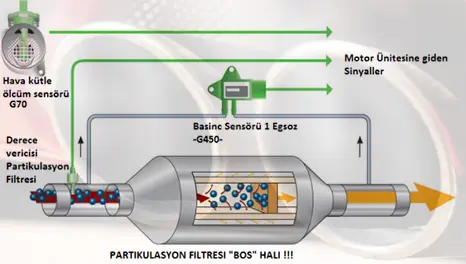Volkswagen Tiguan 2.0 TDI, sağlam yapısı ve yüksek performansı ile SUV segmentinde geniş bir kullanıcı kitlesine sahiptir. Ancak, dizel motorlu araçlarda sıklıkla karşılaşılan dizel partikül filtresi (DPF) tıkanıklığı, Tiguan kullanıcıları için kronik bir sorun haline gelebilir. Bu makalede, DPF tıkanıklığı probleminin belirtilerini, nedenlerini ve çözüm yollarını ele alacağız.

Symptoms of the problem
- Black or White Smoke Exiting the Exhaust
A clogged DPF can cause unburned particles to escape from the exhaust. - Reduction in Engine Power
The vehicle loses traction, especially at high speeds and on ramps. - DPF Warning Light
A DPF-related warning light may illuminate on the instrument panel. - Increased Fuel Consumption
A clogged DPF causes the engine to consume more fuel. - Motor Arıza Moduna Geçmesi (Limp Mode)
Araç, motoru korumak için düşük performans moduna geçebilir.
Causes of the problem
- Short Distance and Urban Use
When the vehicle is frequently used at low speeds and short distances, the DPF cannot clean itself. - Using Low Quality Fuel
Low quality diesel fuel can cause faster deposits in the DPF. - Failure to Perform Regular Regeneration
If the DPF is not cleaned (regenerated) by burning the exhaust gases at high temperature, blockage occurs. - Sensor Failures
Failure of sensors, which are essential for the correct functioning of the DPF, can accelerate filter blockage.
Solution Suggestions
- Forced Regeneration
The DPF can be allowed to self-clean by driving the vehicle at high speed for a certain period of time. - DPF Cleaning
If the DPF blockage is severe, the filter must be cleaned with a special cleaning process. - Checking and Replacing Sensors
The sensors that ensure proper functioning of the DPF should be checked and replaced if necessary. - Using Low Sulfur Fuel
Low sulfur diesel fuels can extend the life of the DPF. - DPF Removal and Cleaning or Replacement
If the filter is severely clogged, it may need to be removed and cleaned or replaced with a new one.
Preventive Maintenance Recommendations
- Regularly drive long distances at high speeds.
For the DPF to clean itself, the exhaust gases must be at a high temperature. - Pay attention to fuel quality.
Using good quality, low sulphur fuels reduces the formation of particulates that damage the DPF. - Keep up with periodic maintenance.
Carry out regular maintenance to detect blockages in the engine system early.
Conclusion
DPF blockage in Volkswagen Tiguan 2.0 TDI vehicles is largely preventable with user habits and regular maintenance. If you notice a decrease in vehicle performance, an increase in fuel consumption or smoke coming from the exhaust, it is important to have your DPF system checked by contacting a specialized service.